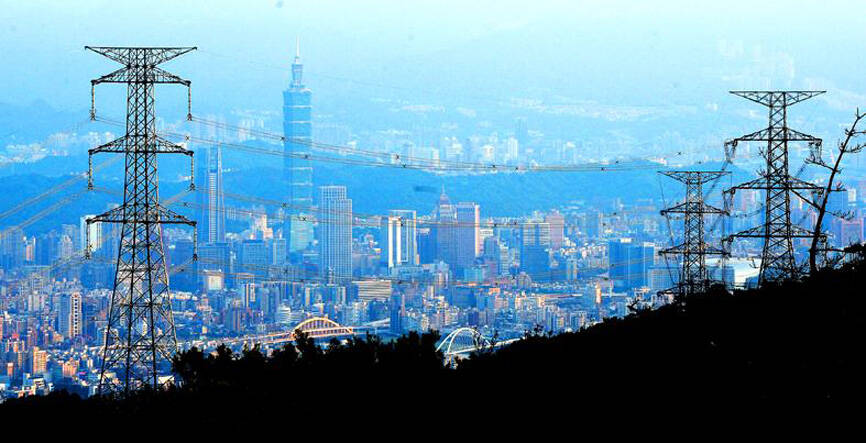President William Lai (賴清德) should deliver a state of the nation address at the legislature and convene a national affairs conference on energy to forge a national consensus on the issue, the Chinese Nationalist Party’s (KMT) Culture and Communications head Lee Yen-hsiu (李彥秀) said yesterday.
Lee made the remark after Taiwan Power Co (Taipower) chairman Tseng Wen-sheng (曾文生) earlier this week said that due to difficulties in electricity development and transmission, any new data centers in northern Taiwan using more than 5MW of power would not be provided with power.
The Executive Yuan on Thursday said the nation’s overall energy supply was sufficient, but the regional supply was lacking.

Photo: Lin Cheng-kun, Taipei Times
It was difficult to develop new power generation sources in northern Taiwan, Executive Yuan spokesman Chen Shih-kai (陳世凱) said, adding that support for the Concord Power Plant, which involves building a fourth liquified natural gas (LNG) terminal, is critical in the government’s efforts to reduce the power shortage in northern Taiwan.
Lee yesterday accused the Democratic Progressive Party (DPP) government of being aware that Taiwan risks having insufficient power, but has failed to apologize for adopting inadequate energy policies that have led to the current situation.
The DPP is attempting to capitalize on the energy shortage and make a political power play by refusing to approve the establishment of data centers using more than 5mw of power north of Taiwan, including Taoyuan, which is traditionally a KMT stronghold.
Lee accused the DPP of denying the residents of northern Taiwan access to power and high-end data centers because the party could not win their “hearts and minds.”
The DPP government could have taken other options such as extending the service life of the Guosheng Nuclear Power Plant in New Taipei City’s Wanli District (萬里) or starting up the Fourth Nuclear Power Plant, also known as the Longmen (龍門) Nuclear Power Plant, in New Taipei City’s Gongliao District (貢寮), to resolve northern Taiwan’s power shortage, she said.
Lee urged Lai to seize the moment to give a state of the nation address at the legislature and convene a national affairs conference on energy to fix the nation’s energy policy.

The first global hotel Keys Selection by the Michelin Guide includes four hotels in Taiwan, Michelin announced yesterday. All four received the “Michelin One Key,” indicating guests are to experience a “very special stay” at any of the locations as the establishments are “a true gem with personality. Service always goes the extra mile, and the hotel provides much more than others in its price range.” Of the four hotels, three are located in Taipei and one in Taichung. In Taipei, the One Key accolades were awarded to the Capella Taipei, Kimpton Da An Taipei and Mandarin Oriental Taipei. Capella Taipei was described by

The Taichung District Court yesterday confirmed its final ruling that the marriage between teenage heir Lai (賴) and a man surnamed Hsia (夏) was legally invalid, preventing Hsia from inheriting Lai’s NT$500 million (US$16.37 million) estate. The court confirmed that Hsia chose not to appeal the civil judgement after the court handed down its ruling in June, making the decision final. In the June ruling, the court said that Lai, 18, and Hsia, 26, showed “no mutual admiration before the marriage” and that their interactions were “distant and unfamiliar.” The judge concluded that the couple lacked the “true intention of

EVA Airways today confirmed the death of a flight attendant on Saturday upon their return to Taiwan and said an internal investigation has been launched, as criticism mounted over a social media post accusing the airline of failing to offer sufficient employee protections. According to the post, the flight attendant complained of feeling sick on board a flight, but was unable to take sick leave or access medical care. The crew member allegedly did not receive assistance from the chief purser, who failed to heed their requests for medical attention or call an ambulance once the flight landed, the post said. As sick

INDUSTRY: Beijing’s latest export measures go beyond targeting the US and would likely affect any country that uses Chinese rare earths or related tech, an academic said Taiwanese industries could face significant disruption from China’s newly tightened export controls on rare earth elements, as much of Taiwan’s supply indirectly depends on Chinese materials processed in Japan, a local expert said yesterday. Kristy Hsu (徐遵慈), director of the Taiwan ASEAN Studies Center at the Chung-Hua Institution for Economic Research, said that China’s latest export measures go far beyond targeting the US and would likely affect any country that uses Chinese rare earths or related technologies. With Japan and Southeast Asian countries among those expected to be hit, Taiwan could feel the impact through its reliance on Japanese-made semi-finished products and